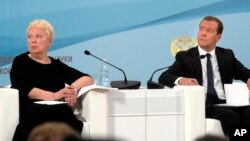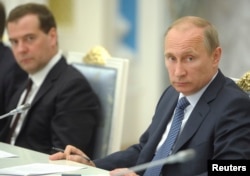President Vladimir Putin’s choice of Olga Vasilyeva as Russia’s education and science minister is proving to be one of his more controversial cabinet appointments, at least for the country’s human rights activists and some representatives of religious minorities.
Vasilyeva, historian of the Russian Orthodox Church, wrote her doctoral dissertation on Soviet state policy toward the church during 1942-48, when dictator Josef Stalin ruled the Soviet Union.
In late June, while she was still working as deputy chief of the presidential directorate for public projects, Vasilyeva was quoted as saying during an address to a youth forum that the most important thing for teachers of the social sciences and humanities was the “worldview platform” on which they stand.
“It is impossible to build the future without a foundation, and that foundation is patriotism — anything else is unimaginable,” she was quoted as saying.
In the same speech, Vasilyeva was highly critical of Ogonyok (Small Flame), the Moscow magazine that became an important proponent of democratic change in the Soviet Union in the late 1980s, but she referred positively to Stalin, saying he “revived patriotism.”
'Symbolic' appointment
It is no surprise that opponents of Russia’s current president were outraged when Vasilyeva was named education and science minister on August 19.
Andrei Illarionov, a former Putin economic adviser who became a harsh critic, called Vasilyeva’s appointment a “symbolic act.” He noted in a blog posting that it took place on the 25th anniversary of the failed attempted coup against reformist Soviet leader Mikhail Gorbachev by communist hard-liners — and on a day that Putin was visiting Crimea, the Black Sea peninsula Russia annexed from Ukraine in 2014.
The Federation of Jewish Communities of Russia called on Vasilyeva to clarify her attitude toward Stalin and his role in the history of the Soviet Union, and "not leave room for ambiguity, because this is important not only for education but for the future of the country."
Nikita Petrov of the Memorial human rights group, which was founded in 1989 to prevent a return to totalitarianism and help rehabilitate victims of the Soviet regime, told VOA’s Russian service that while he did not believe that Vasilyeva’s positive references to Stalin in her June speech were accidental, he also did not believe the Russian government was either seeking to revive Stalinist state terror or to justify it.
'Ideological devices'
At the same time, Petrov said “ideological devices” like “statism and patriotism” are being revived, despite the fact that Russia’s constitution requires a recognition of “ideological diversity” and prohibits the establishment of any “state or obligatory ideology.”
“As a result, we see that there is an attempt to develop the teaching of history in school not on the basis of an accurate knowledge of the facts, or on the basis of a scientific understanding of these facts, but on the basis of ideological devices like statism, patriotism and even Orthodoxy," he said. "The Kremlin ideologists do not consider history a science, but simply an instrument for nurturing a patriotic consciousness.”
However, ignoring the crimes of the Soviet era eventually will lead again to the cynicism that ultimately brought about the Soviet Union’s collapse, Petrov said.
Historian Boris Sokolov, who has analyzed Vasilyeva’s articles and speeches, told VOA’s Russian service that they reflect the Russian authorities’ ambivalent attitude toward the Stalin period. While there is mild official criticism of the era’s repression, he said, there is approval of its “imperial” foreign policy.
Memorial board member Yan Rachinsky told VOA he did not believe that Putin or his prime minister, Dmitry Medvedev, were “fans of Stalin” or “inclined to justify repression.” Still, he said Russia’s top leaders did not understand that their system of values was helping to revive Stalinism, which he described as exalting the role of the state in a complete disregard for human life.
Accent on power, not welfare
"And what Mrs. Vasilyeva said before becoming [education and science] minister boiled down to the same thing: Yes, there were victims [under Stalin], but, on the other hand, the territory of the state was increased, the war [World War II] was won, industrialization was carried out — and lots of other similar considerations,” Rachinsky said. “And it turns out that the new minister of education of Russia believes the main thing for the country is increasing its territory and military power, not the welfare of its citizens.”
Meanwhile, the governor of Russia’s Volgograd region, Andrey Bocharov, announced this week that an airport in the region’s capital, Volgograd, would be renamed Stalingrad Airport.
The city of Volgagrad was renamed Stalingrad in honor of the Soviet dictator in 1925. The name was changed back to Volgograd in 1961, eight years after Stalin’s death.





